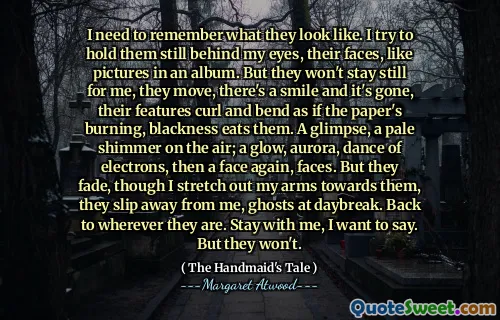Night falls. Or has fallen. Why is it that night falls, instead of rising, like the dawn? Yet if you look east, at sunset, you can see night rising, not falling; darkness lifting into the sky, up from the horizon, like a black sun behind cloud cover. Like smoke from an unseen fire, a line of fire just below the horizon, brushfire or a burning city. Maybe night falls because it's heavy, a thick curtain pulled up over the eyes. Wool blanket. I wish I could see in the dark, better than I do.
In "The Handmaid's Tale" by Margaret Atwood, the imagery of night evokes contemplation about the nature of darkness. The phrase "night falls" suggests a descending heaviness, contrasting with the uplifting connotation of dawn. This creates a sense of inevitability about the onset of night and its weight, as if it obscures vision and understanding, compared to the enlightenment brought forth by daybreak.
The description of night as a black sun rising gives a striking visual of darkness spreading across the sky. This notion implies an ominous presence, akin to smoke from a hidden fire, suggesting both destruction and a loss of clarity. The yearning for better vision in the dark symbolizes a desire for insight amidst confusion, resonating with the themes of oppression and the struggle for clarity in the narrative.






